Fluctuations in traffic happen to the best of us. Yet, there is no excuse for poor content strategy on your website. There are two types of content from the point of view of relevance over time: the first category includes any article written based on a trending subject. Its advantage is that, treated properly, it boosts your website’s audience overnight – of course, the inherent drawback is that people will shortly lose interest in that specific subject. The second type of content does nothing of miraculous sorts overnight – you may not even see anything spectacular about it on the short run.
Evergreen content is content that remains valid over time, it is timeless and always attracts new readers.
Evergreen content treats a topic that doesn’t date quickly (or at all?) and retains relevance; this way, it delivers growth in traffic, leads and social media shareability over a long period of time as well as associated revenues. While news are crucial in our rapidly ticking clocks, when thinking on your return on investment you have to keep in mind that timeless content builds brand trust on the long run, especially when researched properly.
The Evergreen principle is a key part of all well crafted content marketing strategies. This blog post presents you with a curated list of evergreen content ideas that will help you increase your website traffic.
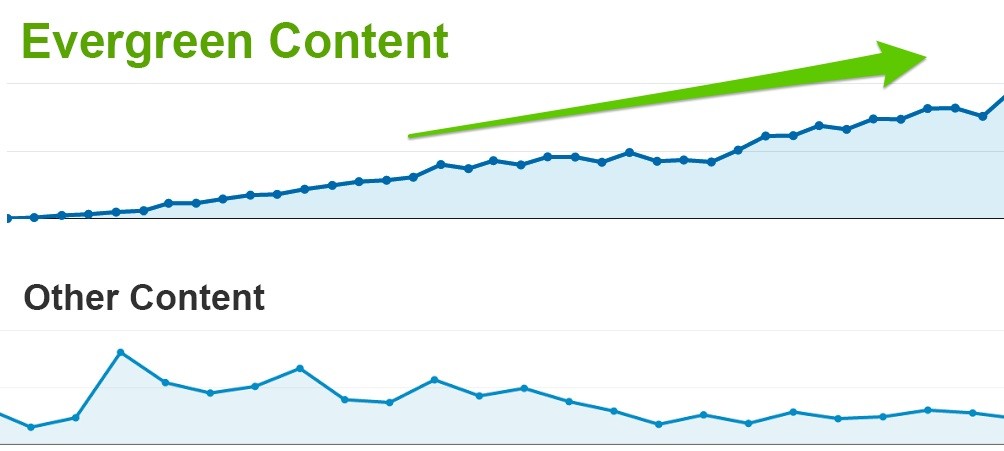
WOW Evergreen Content Ideas
- Case Studies
- Stats and Data
- Product Reviews
- The History of Something
- How To Guides
- Beginner’s Guides
- Curate Content
- Lists
- Top Tips for People to Understand Your Industry
- Best Practices
- Checklists
- Reference Books in Your Market
- Rethink a Common Viewpoint
- Refresh and Update Old Content
- Definitions, Glossaries, Acronyms
- Attack a Sub-Niche
- Series of Tutorials
- Strategies for Common Problems
- Famous People Interviews
- Failure Stories
- Your Success Story
- Storytelling
- Encyclopedia Entries
- Pros and Cons of Something
1. Case Studies / White papers
Writing relevant evergreen content in the form of a case study is not easy. However, it depends a lot on the industry you’re active in. For instance, if you’re making a case study now about the latest Android updates, it’s hard to believe that you’ll have a constant flow of readers in 6 months’ time.
A white hat SEO case study will maintain relevance as long as you treat it as an evergreen practice that works like a reference. Stories about major traffic increases and other ranking plot twists tend to be relevant and timeless, because they reveal a way of handling a difficult situation. And we all know how much this weighs.
All content marketers should consider crafting Impact to Last Case Studies!
If, on the other hand, you’re covering subjects like higher education, a good white paper on pedagogical practices has real chances to be a steady source of readers 5 years from now. In my opinion all content strategies should include case studies. They increase the trust of your brand as well as provide valuable website traffic.
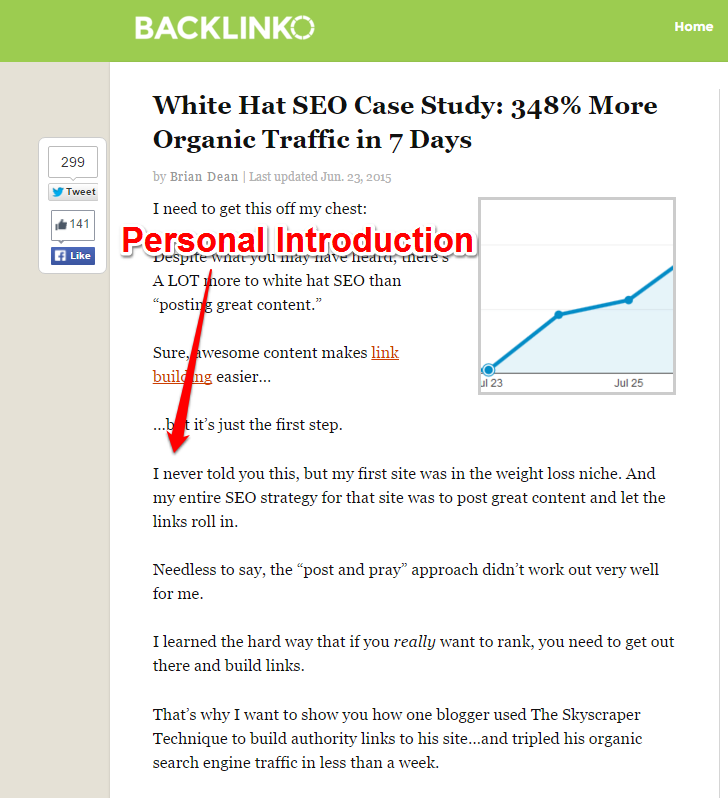
2. Stats and Data Build Great Evergreen Articles
As long as you include the period you’re talking about, they keep relevance even after a period of time has passed. It’s entirely your choice whether you adapt it to the present status quo or just keep it like that for people who look for references in the past. However, it doesn’t hurt to update stats from time to time, especially when they’re about such a dynamic and volatile domain. Exposing statistics in an appropriate context is useful in itself, as it also helps your audience to understand the perspective instead of a situation of little relevance. However specific your conclusions may seem, your audience will extrapolate to their practices, which ultimately leads to relevance and credibility as a source. Context is relevant for your niche, and you should give your readers the information that they needed to know.
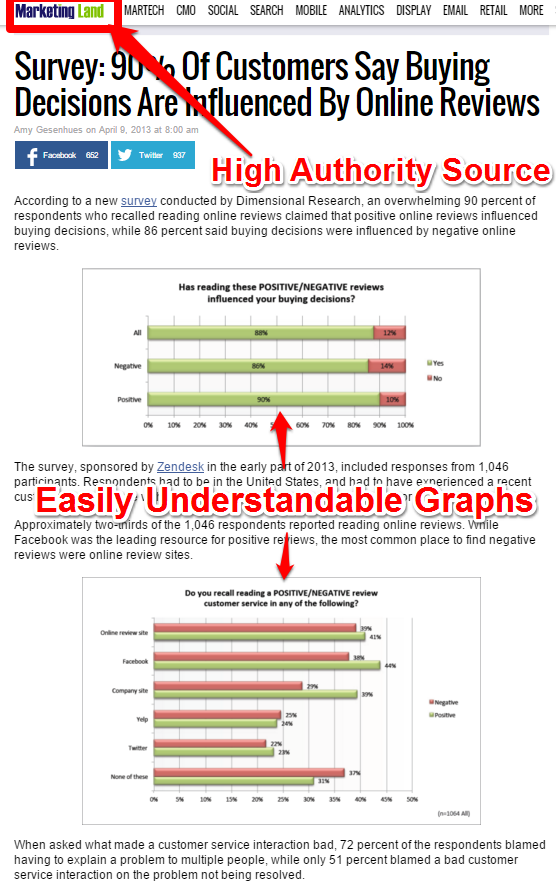
When it comes to statistics, you may think that your numbers and figures are not relevant to the people around you, but you may be wrong about that one. Our capacity to extrapolate and extract the essential from what is being shown to us trumps specific differences. If you believe there are certain shared aspects about your situation, be willing to share them!
And there’s the other type of facts and figures as well – the ones that put things in a new, more enlightening manner. Things that weren’t necessarily unknown to you, but needed to be made clearer.
In such cases, it’s the effort that is going to pay off in time, through content that not only doesn’t date, but also keeps a fresh eye over things of particular interest to people in your niche. And effort doesn’t just mean professional research that may take days, but also presenting your information in a manner that engages your audience – since the digitization of information has made us very graphic-sensitive. Speaking of online reading behaviors, this is a great example of evergreen content – since it’s based on how technology influences our brain wiring.
It doesn’t matter how “boring” your niche is! The “statistics and data” topic is one of those evergreen topics that always allow you to generate content ideas.
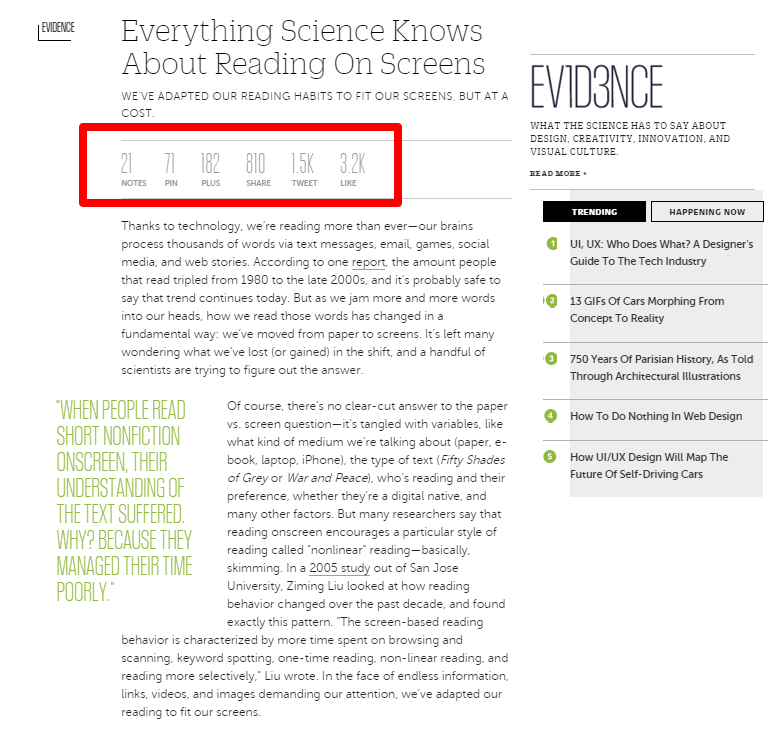
3. Product Reviews – Longlasting Content that Generates Traffic and Sales
Reviews are based in general on one of the two following ideas: either on what the masses think – which makes it not always reliable, or what an expert in the field believes of certain, specific features.
The second technique is always more trustworthy, mainly because credibility is built around competence – instead of reviewing something very far from your area of expertise, where you’ll be just another user, by analyzing a product that is related to your work (even remotely) you build engagement on the long run. It tells a story that people will be willing to hear, and if among your audience there are some who share your opinion, this will work as a binder. For instance, Firstround, a tech-oriented company designed to facilitate contact between ideas and entrepreneurs recently, reviewed the widely popular Producthunt.
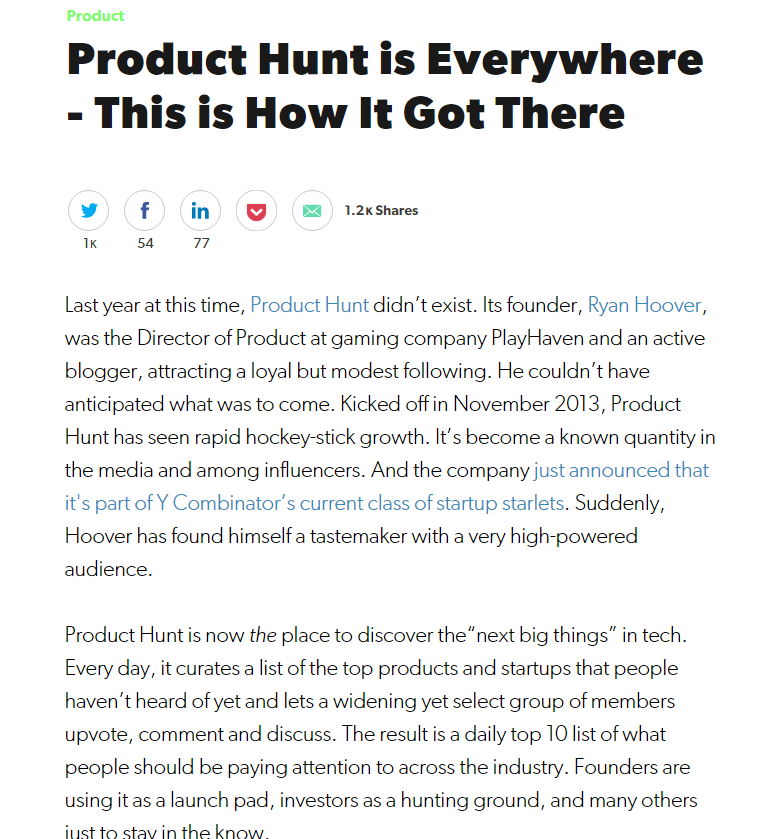
The insight of a review helps you to build credibility. It is recommended not to lose touch with the product after the article is published. Update it from time to time, depending on what major changes have happened since your analysis – this helps you to maintain accountability. That doesn’t only help your readers to understand the review better and rank it higher in their preferences, but it also boosts your image, suggesting that you have an eye for detail and you’re passionate about your niche. However, if you’re posting on a popular news site for your target audience and you’re an influencer, chances are you’ve hit the Jackpot. Here is one example of evergreen content that generated over 170k views. This proves that this is one of those popular posts that generated a lot of traction.
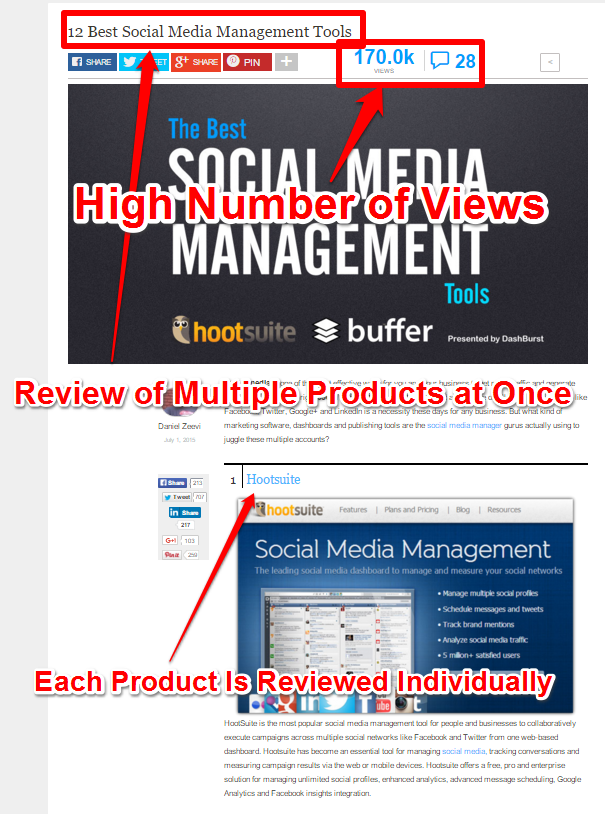
4. The History of Something
Contextualizing an article in such a manner as to make it relevant to your target creates exceptional content that will bring you steady traffic. Of course, instead of trying to fill out this article with superlatives because it is fancy, my definition of exceptional content lies around relevant information, uniquely put to be remarkable and memorable. Writer’s block is something that all of us have suffered from and this is why it’s perhaps so easy to relate to it. You don’t have to take part in literary contests monthly, it’s enough to be a copywriter to know precisely what it means. But when you’ve got an audience in mind, it’s not that hard to keep them interested in the history of something they already like.
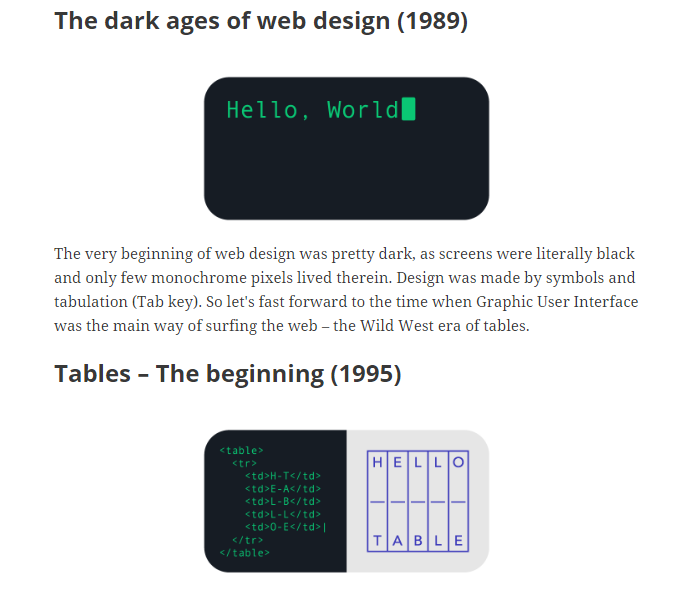
5. How to Guides + The Repurposing Content Technique
From caring less about what people think of our daily decisions up to using Google Analytics URL builder to track campaigns, we all need guidance at some point. Human diversity makes our needs not only perpetually different, but always in search for new solutions. Breaking the answers into easy steps more than halves our problem-solving jobs, thus becoming a great source of evergreen content – as long as the approach doesn’t refer to something very time specific.
Publishing useful content such as “How to Guides” is of great importance to any content marketing strategy.
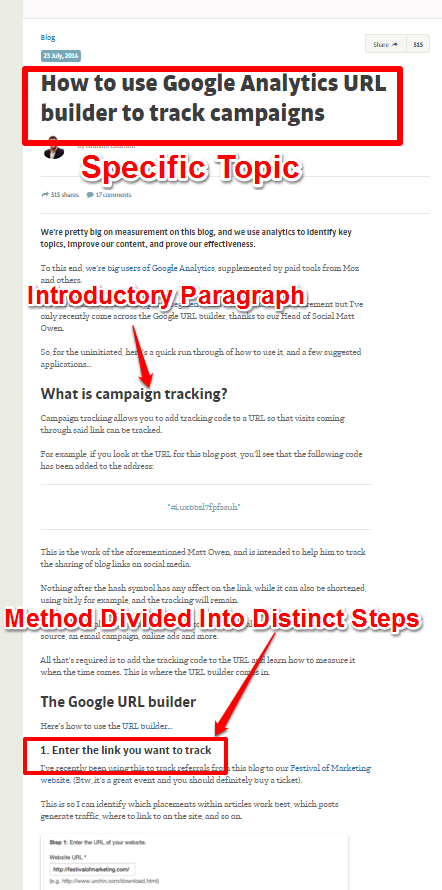
For instance, if your ‘how to’ article refers to specific settings of an operating system’s version that may as well be outdated in a few months’ time, your guide will hardly be relevant one year from now. Instead, addressing a more timeless issue, however specific it may be, will bring a steady flux of readers to your blog instead of a spike followed by an equally sudden drop. Getting started with advanced remarketing is an appropriately formulated evergreen idea, pointing towards a general direction instead of a recipe that can get old.
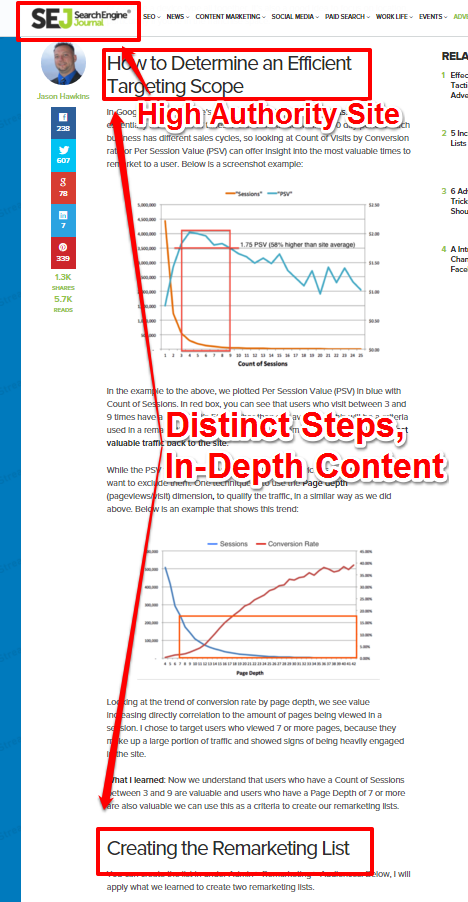
You could also repurpose content by creating a mini-series from the “Howto Guides” content idea.
Repurposing content is as simple as splitting the big “How to Guide” into smaller pieces of content.
It’s always a smart idea because it takes less time and can be applied to content that already proved to generate traffic.
6. Beginner’s Guides – Simple Yet Effective Evergreen Content Idea
This is not a step by step tutorial on how to create the ultimate guide. Its aim is to help you understand that guides are yet another effective tactic to build long-lasting content.
One could argue that this one is roughly the same as number 5, to which I would have to beg to differ. The fundamental difference between the two is that the second one is a more bountiful source of evergreen content. While the very specific steps of doing something may change over time, the basics are less prone to suffer dramatic transformations.
Think of it as a huge spiderweb of theories and practices – the outer edges are softer, easier to modify than the very core of that technique.
Beginner’s guides are easily built. They will still be relevant in a few years, regardless of the dynamics of your domain. Yes, the web is as volatile as it gets – and yet, any content writing 101 will advise you to never compromise quality over anything before any other lesson, just like it did two or three years ago. This evergreen content example from Moz does a great job.
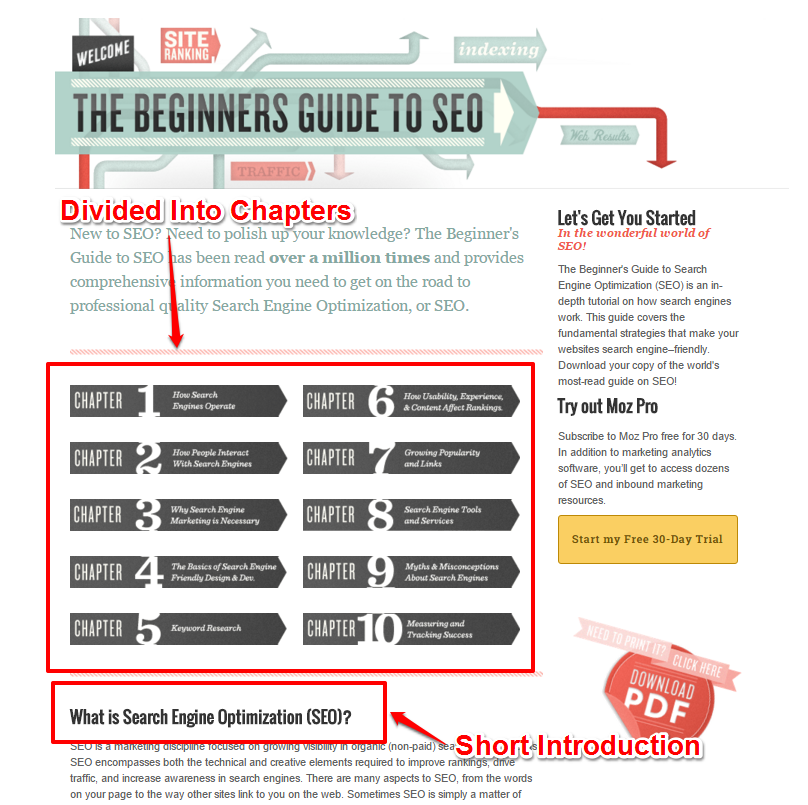
Plus, there’s the undeniable advantage of more interest – the more general the topic in question, the higher the interest rate of reading that. And while this could be perceived as sad and superficial, it actually shows that we’re curious and always eager to try out new things.
Unlike a very specific topic that attracts a small, but constant flow of readers, the less specific topics cover a broader audience, which also comes in relatively constant flows, such as Neil Patel’s beginner’s guide to online marketing.
7. Curate Content without Using Content Creation
Whenever trying to better understand a domain, people often get lost in the uproar of information. There’s no wonder why curating content is one of the most solid sources of evergreen content – it’s easy to access and it’s already systematized, giving a general sense of direction to whoever lands on your page. But perhaps the most outstanding quality of this type of article is that it is easy to follow, take notes on and come back to whenever losing compass. This aggregation of content writing secrets makes an illustrative example for content marketers.
Don’t oversimplify. Give all the necessary information, and try to keep rich content within a simple structure – it’s what most of us look for when dealing with a new field.

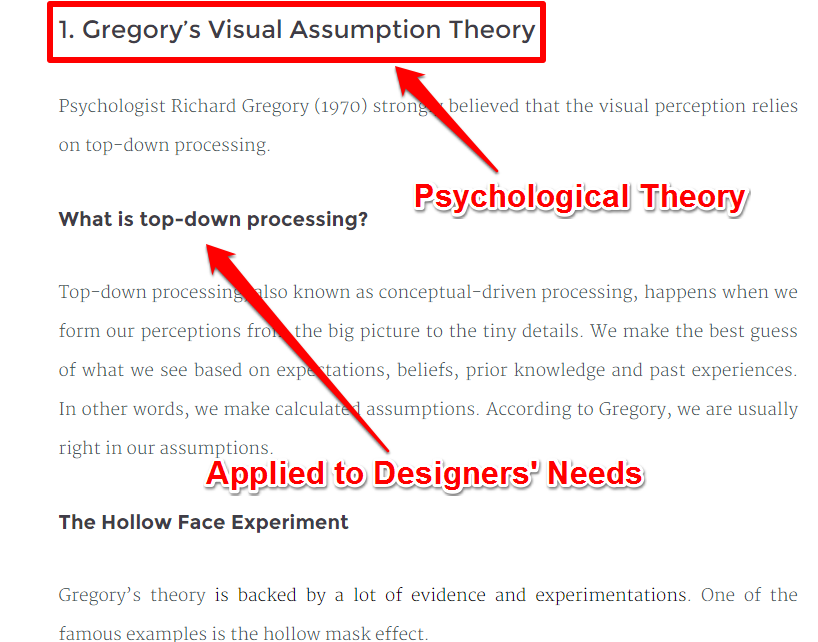
8. Lists – A Classic Evergreen Content Idea
They don’t have to be all insanely long, but they do have to be exhaustive. Whenever you’ve decided to hit enter 20 times, it would be amazing to actually include everything your reader needs to know – the very idea of reading lists is to deplete all the possible questions.
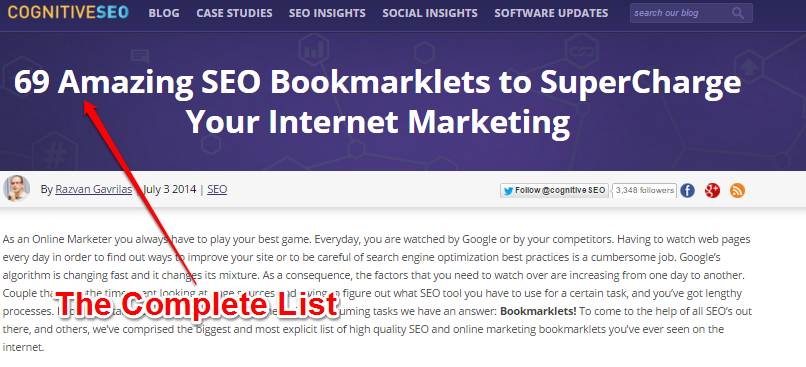
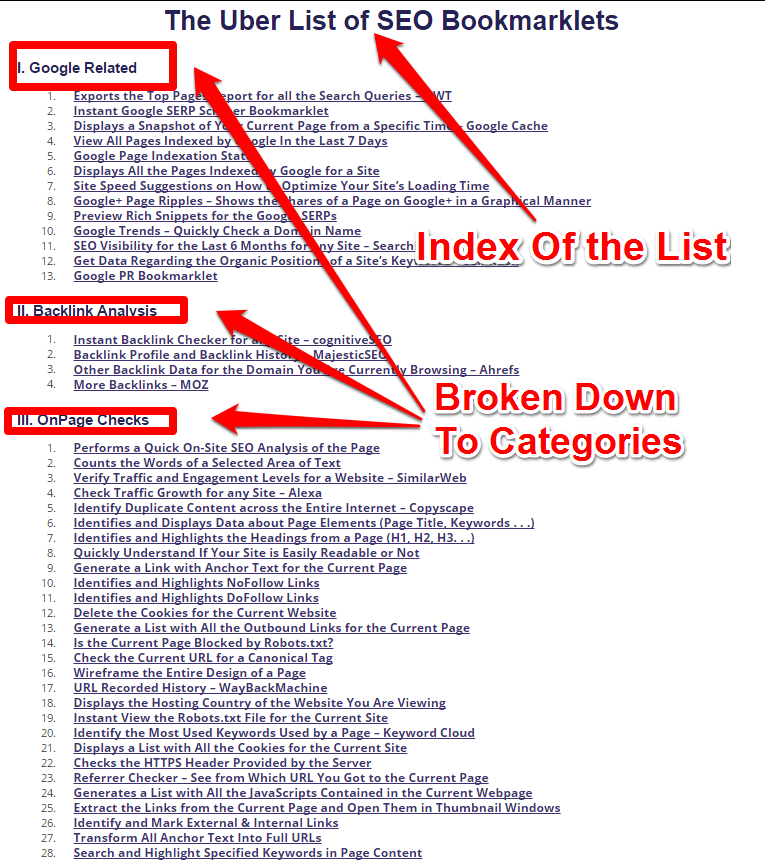
If you’re doing a very good job, people won’t only read your article once – they will come back remembering what a good source of information you were, like they did with this list of content creation tools. Don’t disappoint!
9. Top Tips for People to Understand Your Industry
It’s not uncommon, especially on the web, for people to want to know more about the services they’re paying. Regardless of the type of service that you’re offering, clients will always want to know more about your industry – it gives them the feeling that they’re in control, not left outside, not outsourcing because they’re not up to date anymore. This is exactly why you’d like them to be informed, and you also want to be the one who’s giving them the insights. This way, they won’t only be able to understand and appreciate what you’re doing, but assign it to you as well, understanding the effort behind the lesson.
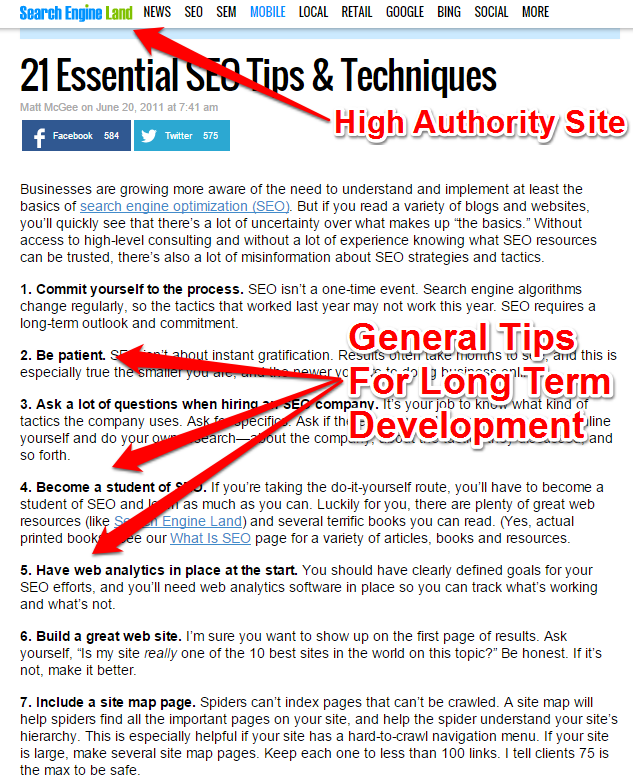
Giving tips, as much as it may seem like a professional violation, is a great way to get closer to your clients. Use it well and witness it as part of your ROI. This blog post on how to grow your twitter followers for instance has 4.5 k shares and generated engagement on page as well in the comments’ section, through effective, personal advice.
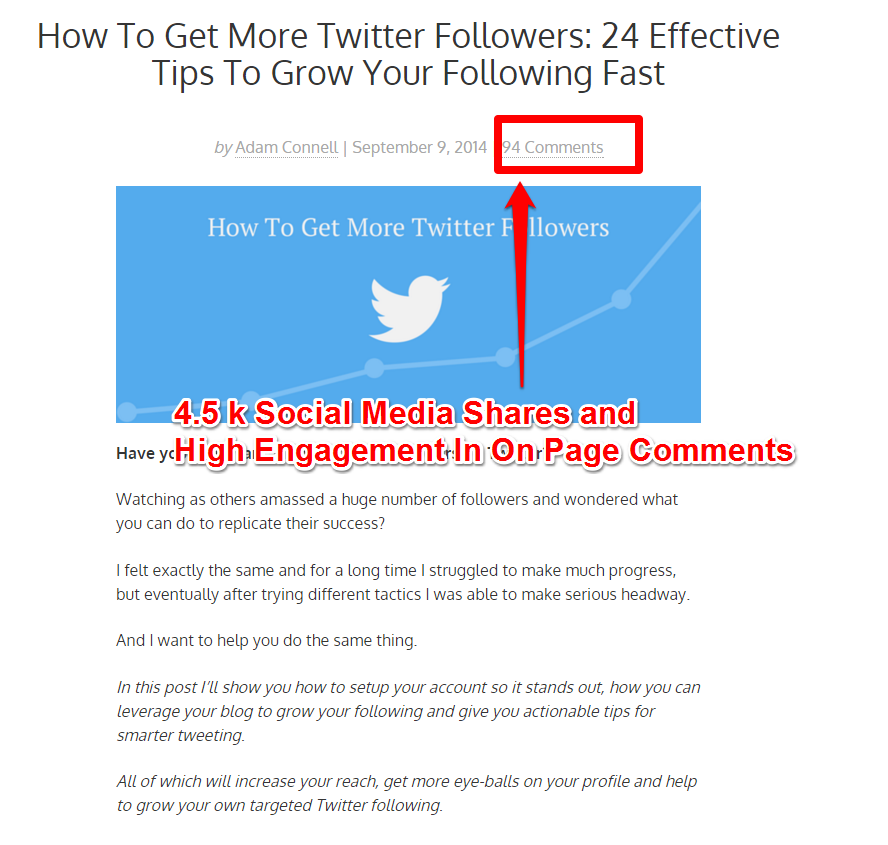
10. Best Practices – A must for any Content Marketing Strategy
I was just saying that there are no recipes. I stand by that. However, people who’ve achieved success have all the right to preach their way into doing it properly. If you’re one of the lucky actors in your business, don’t keep it to yourself. I agree that market share isn’t something you’d like to lose in front of your competitors, but some guidelines never killed anybody (aside from the Pirates of the Caribbean, at least). If you’ve got your eyes on building credibility, a great take away for your readers is a valuable piece of advice.
No content marketing strategy should be considered complete without the inclusion of the “Best Practices” content concept.
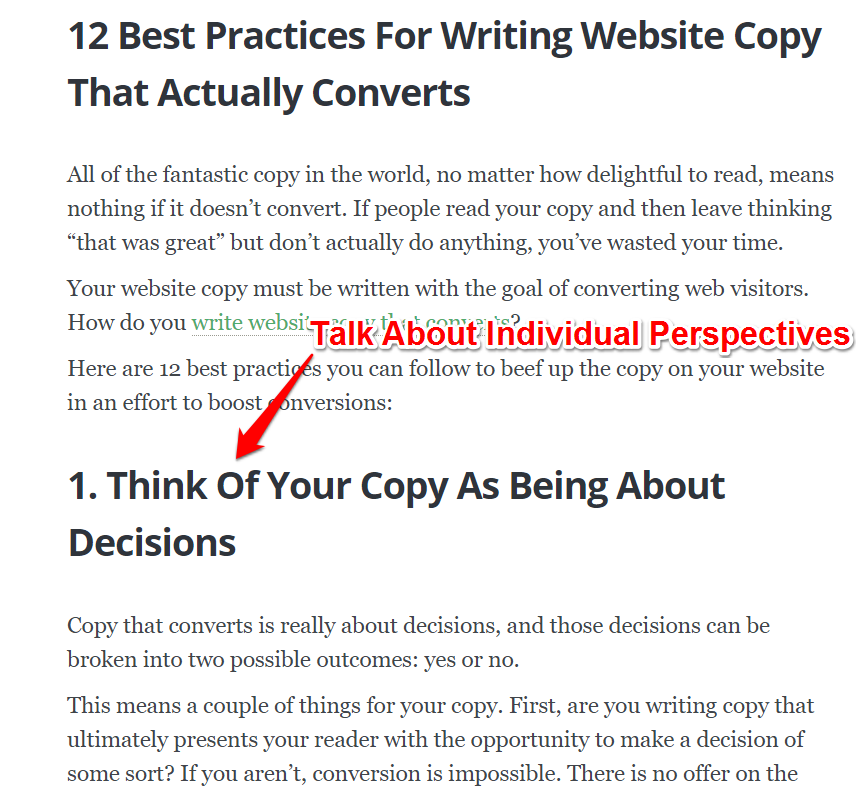
Be that as it may, the idea that evergreen articles aren’t ‘soft’ copywriting should never leave your mind; after all, you’re only as good as the advice you give. Businesses claim to practice and value good writing, but effective copy should be a business-wide endeavor, focused on maintaining relevance. Here’s an article that advises against so called ‘best practices’.
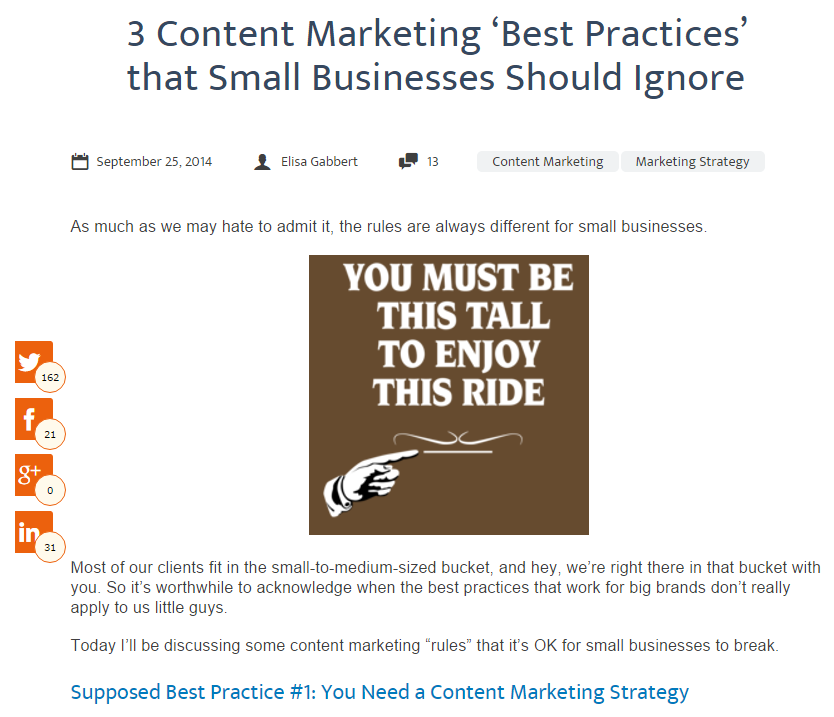
11. Checklists
The difference between a checklist and a simple list is that the second one is more of a process rather than a conglomerate of things that may be taken randomly.
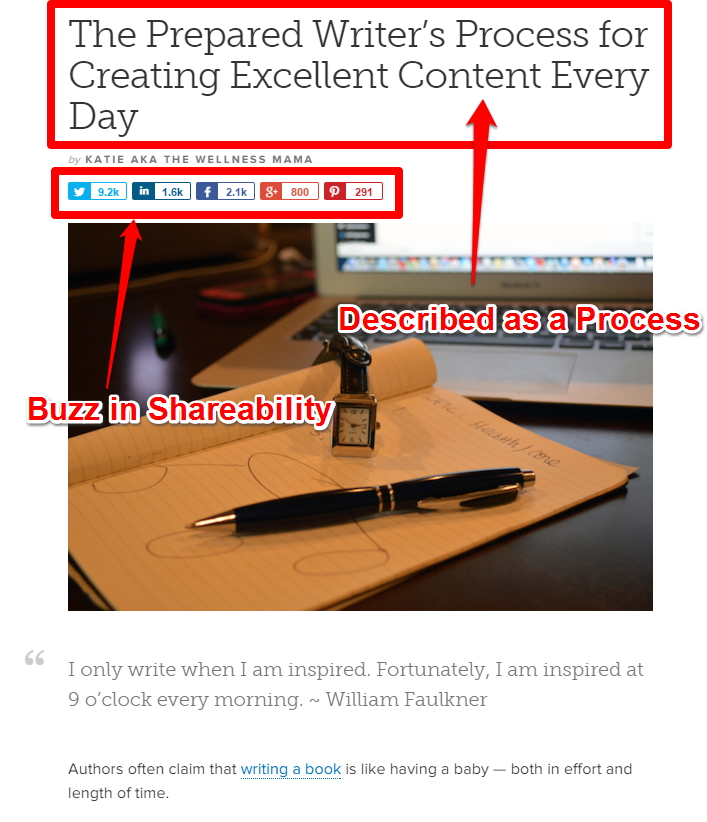
You may want to treat these seriously and without leaving out important pieces of advice. This type of content is supposed to guide the reader through a process that you’ve simplified through your personal experience. So don’t be surprised if, at the end of the day, a conclusion will be drawn correlating the checklist accuracy and your performance as a professional in the niche.
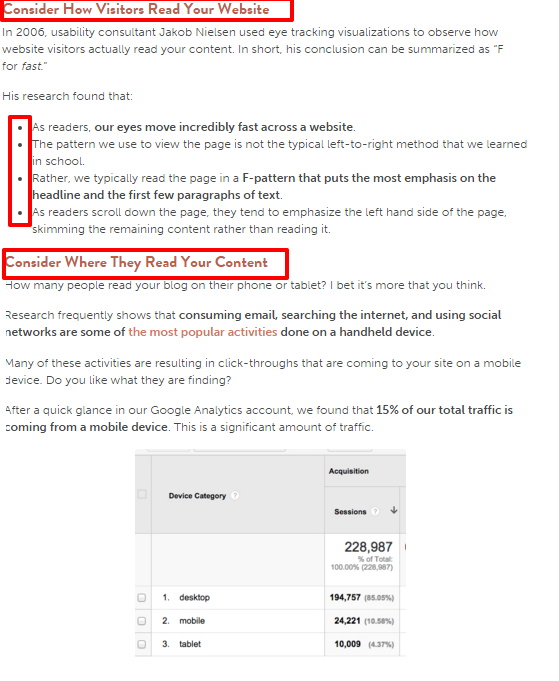
12. Reference Books in Your Market
Everybody’s got to start somewhere. You did. Don’t be shy – tell people what remarkable reads gave you perspective. But unlike lists, book recommendations don’t have to be exhaustive. There is no universal recipe, neither are there sets of books that guarantee performance. Tell your readers what you’ve gained from the lectures you’ve particularly enjoyed and what was about them that helped you so much along the way.
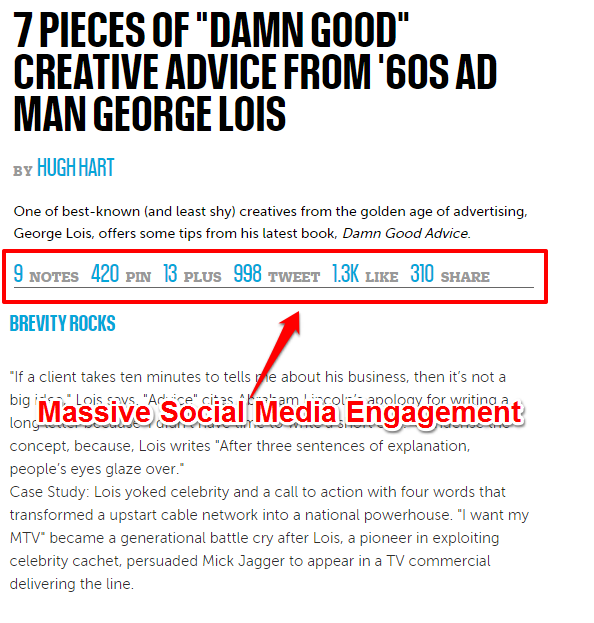
Instead, focus on outlining what a great job those reads did in completing your knowledge, or founding it, fixing a point of development that you will give details about. There’s no need to be dramatic. Realism about people who influenced your knowledge and their work is what builds reliability – start small.
13. Rethink a Common Viewpoint
The world is one huge confirmation bias. Anything you’re trying to say will be a lot better received by any audience if it confirms their previous empirical theories. And while stating a fact that we all agree with can go unobserved, stating the opposite will be seen as an outrageous act that’s prone to create buzz. There’s nothing wrong with a more powerful approach to state the importance of what you’re about to expose.
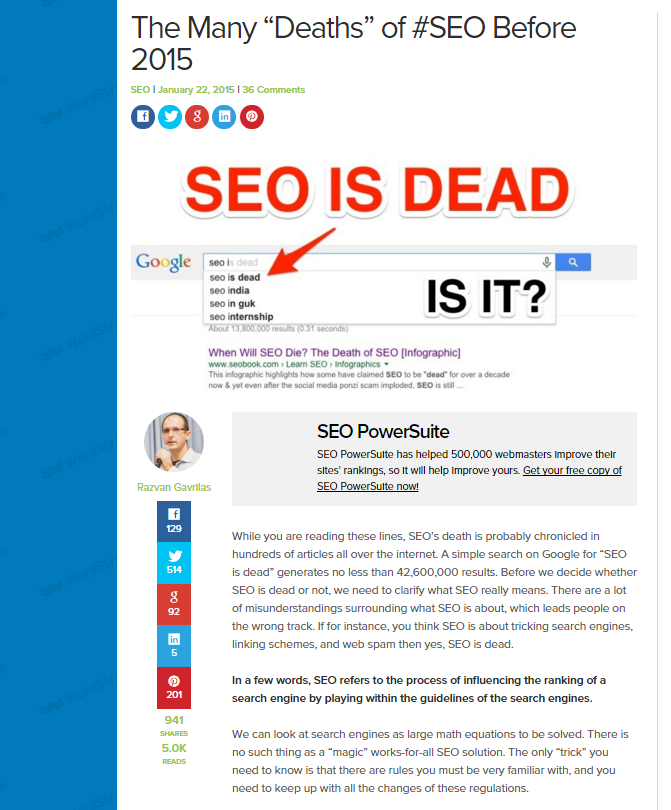
There’s a fine line between not taking any common misconception for granted and doubting everything that’s common sense. As much as I’m a fan of new perspectives and twisted points of view, keep in mind that your arguments have to be significantly more powerful – after all, you’re trying to change an opinion instead of confirming one and we know best how reluctant we all are to that. An approach of myths and misconceptions in your niche can be informative even for the pros, exploiting a trait that often enough ruins businesses – debunk undocumented misconceptions.
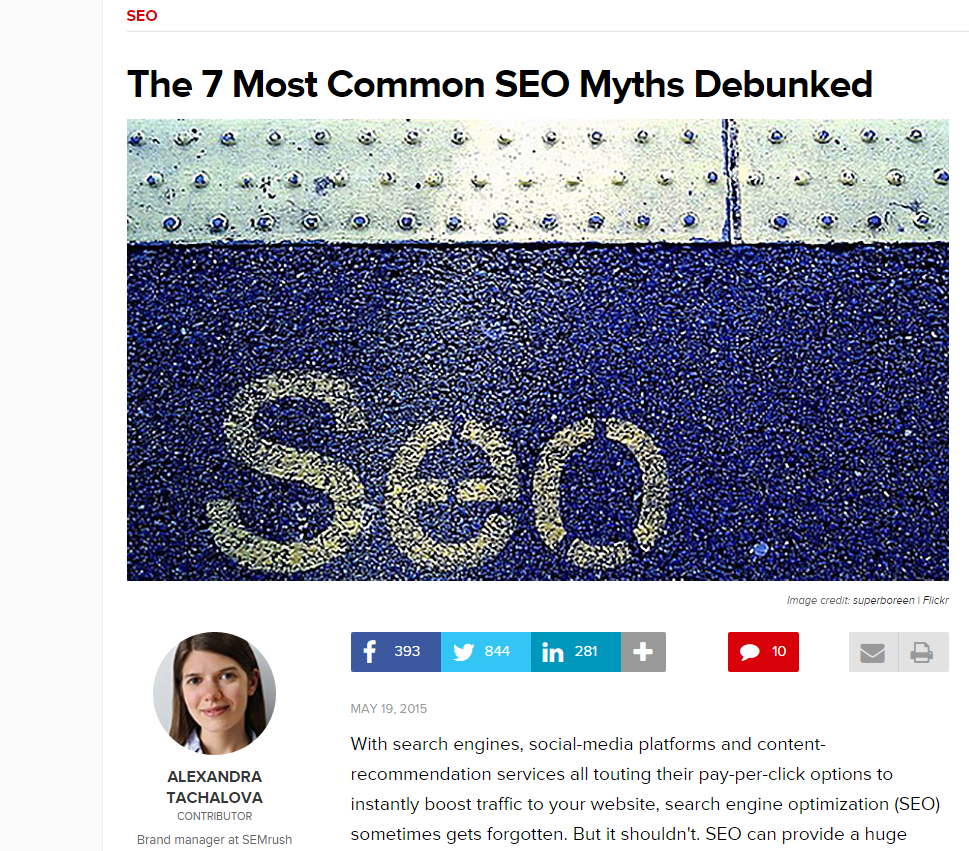
14. Refresh and Update Old Content – How old stays fresh
Sometimes it’s hard to let a great article go; the harder you work on it, the more you get the feeling that it’s unfair how no one opens it in 6 months’ time. Old content can be recycled and updated, having the great advantage of creating a deeper perspective – since it’s already been documented once.
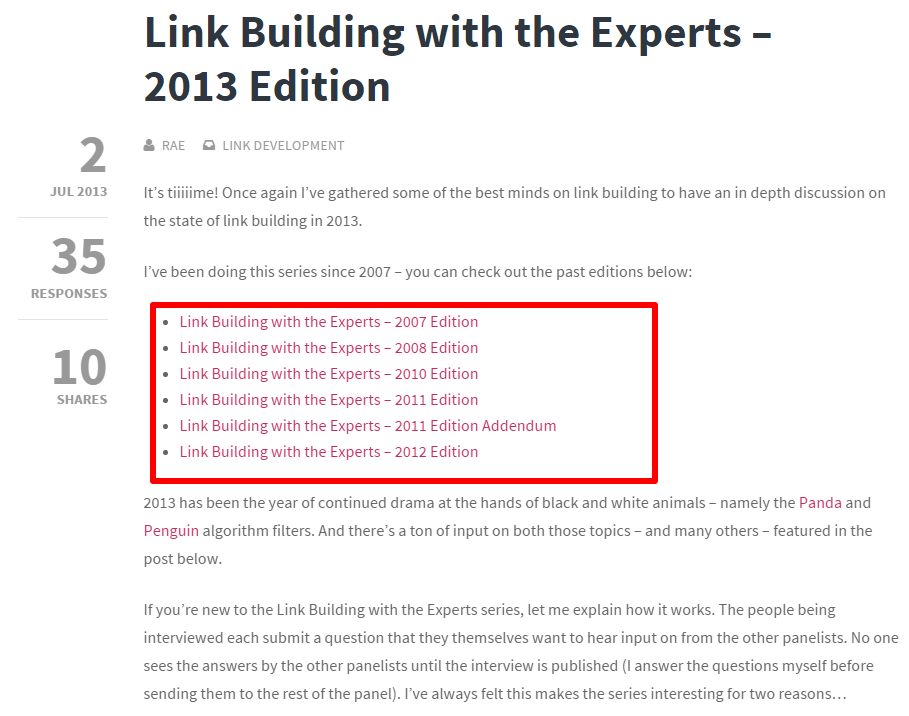
Every time you decide to update it, its informational value increases, provided that you don’t just do it out of sentiment; the easiest way is asking yourself what is that an article should have to keep you interested in reading it two years after it’s been originally written. Then document it accordingly to guarantee its relevance in time.
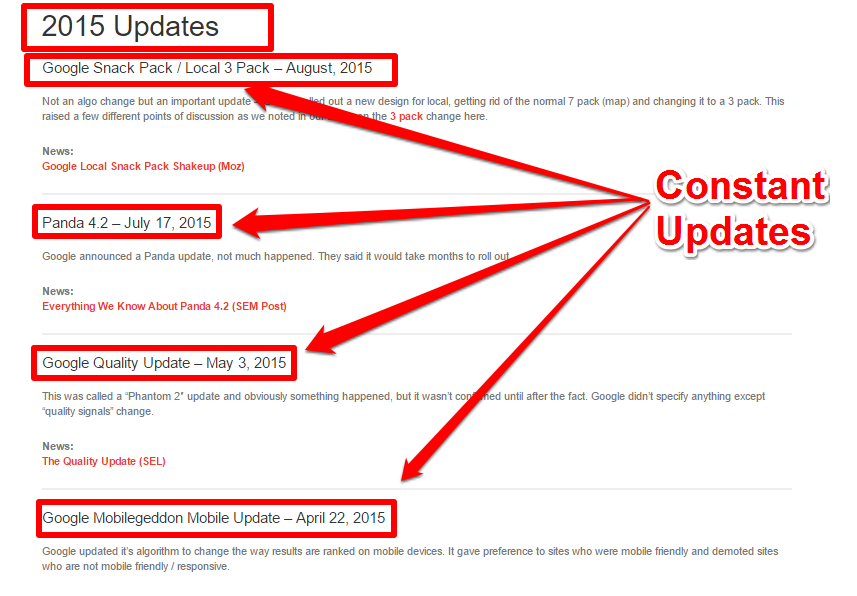
15. Definitions, Glossaries, Acronyms
Being humble does pay off. And since business is all about competitive advantages, you wouldn’t like to seem arrogant. Working in an ever changing niche is sometimes overwhelming in terms of keeping vision and relevance – and it’s not any easier for your clients, either. Their perpetual effort is to always know what to ask from you, and sometimes this is not an easy job. Give your readers a good start.
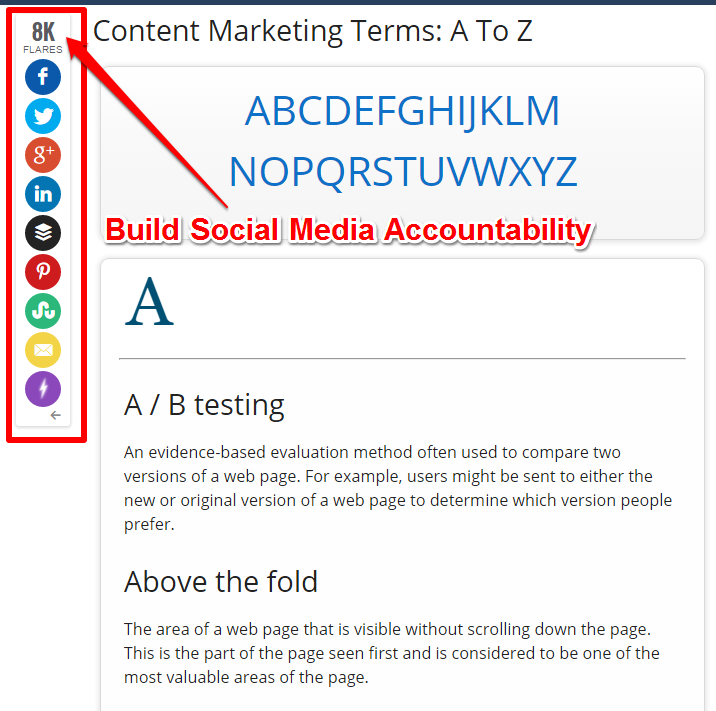
In this context, an intro in the terminology of your niche is a godsend idea – it is your way of letting your clients know there’s nothing wrong about the inability of mastering your slang, as you’re going to offer them constant guidance from the very first step. While this kind of content may seem redundant to you, it’s a well received declaration of humility in the eyes of your clients that you wouldn’t like to miss out on.
16. Attack a Sub-Niche – A Fresh Lead Generation Concept
Google has been making annual studies concerning people’s informational needs ever since 2011. They suggest that the search engines, as much as us, should pay attention to in-depth content analyses more.
Additional research proves that the long, well documented content that we see boosted during some Google searches consists, actually, of evergreen posts that are worth reading if you’re looking to a more specific understanding of the topic and not just a short definition or intro. It doesn’t have to be exactly ‘War and Peace’ in length, but relevance is a must.
This concept can also be used as a lead generation technique. You will be able to tackle new types of personas that you did not test until now.

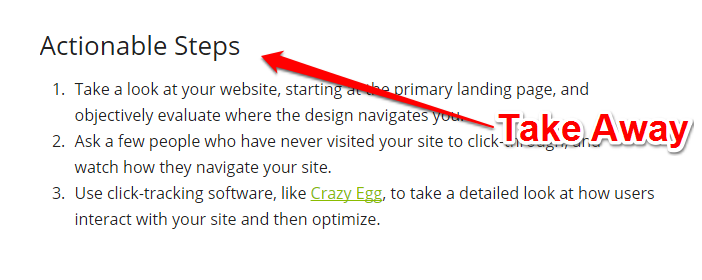
17. Series of Tutorials
DYI techniques have sprouted in our lives quite as much as cat videos, and we tend to love them equally, to take pride in not having to subscribe to an entire course just to perform something that is somehow out of our area of expertise. The genesis of this idea lies in our very varied needs. Generally, the things we follow tutorials for aren’t our first-class priorities, but somewhere in the second or third place, where it’s important to be knowledgeable, but only as a complementary direction from what we’re usually doing. This is why tutorials come best in series, satisfying the very beginners as well as the pros. Also, there’s the advantage of being able to stop whenever you’ve achieved the level of knowledge we were aiming for.
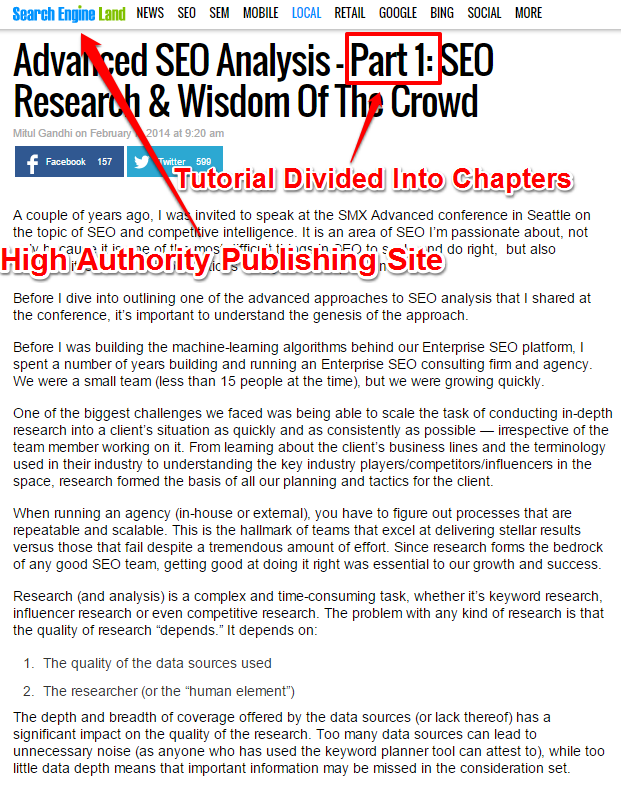
18. Strategies for Common Problems
Let’s assume that your strategies refer to a broad area rather than a niche. Your approach would work best when detailed and well documented. Effective, practical strategies should attract people regardless of the time frame, but you would still have to be specific about the execution of every step you’re suggesting. Giving solutions to general issues in your industry establishes a more manageable connection between you and your key public. Embed some of your core values in the execution of the tactics, making your whole approach specific and recognizable.
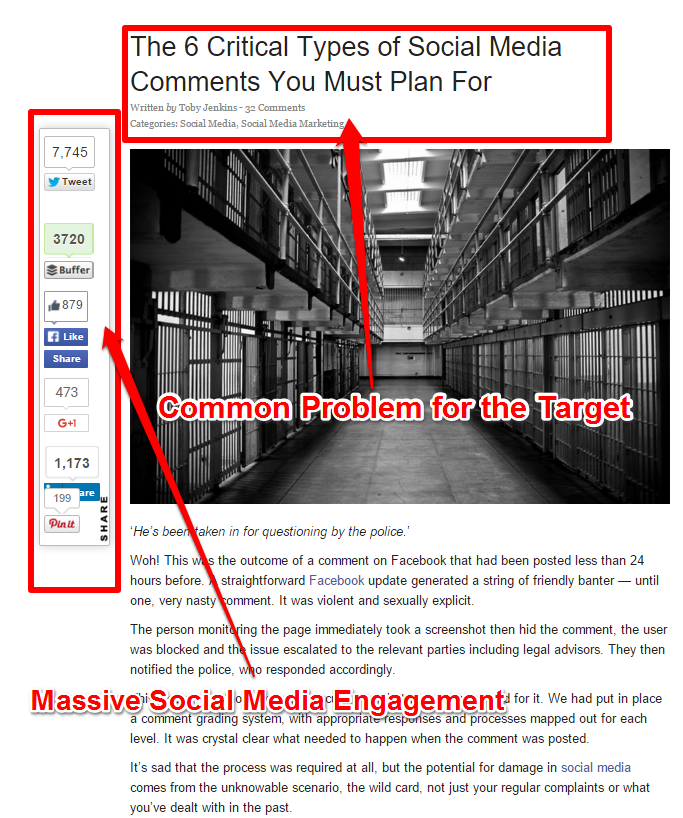
19. Famous People Interviews + Influencer marketing to Boost Your Website Traffic (Bonus)
They say truth is a matter of perspective. Our influencers have made it to our top stories through hard work, endless amounts of coffee and very little to no free time. However, it’s sometimes refreshing to see the man behind the blog post, that potent machine that turns trends to ashes and unknown practices to trends.
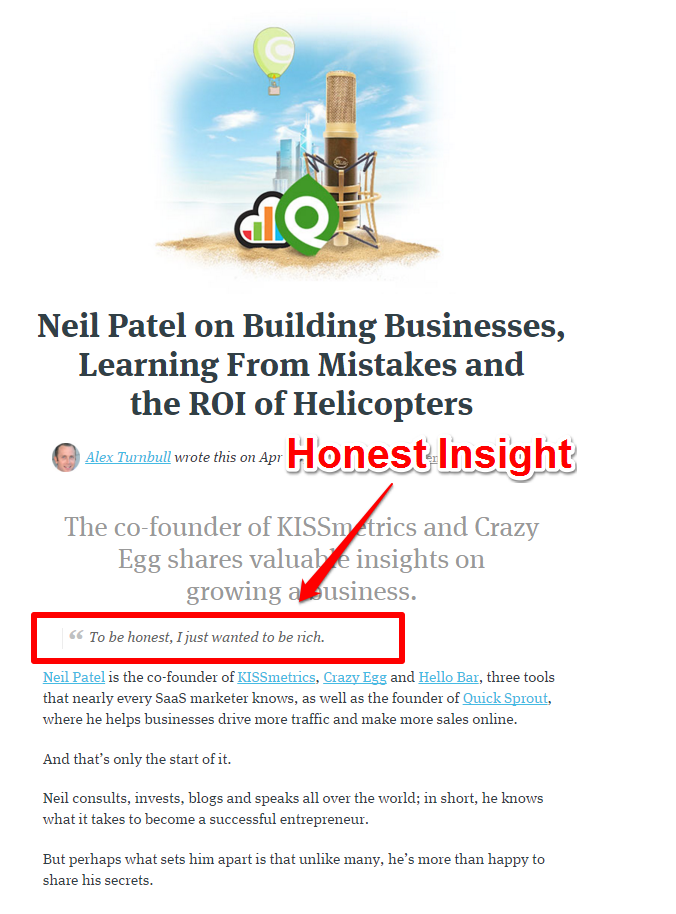
Seeing someone in an interview is getting a sneak peek of the person behind the persona. And while this is sometimes a little off topic, more often than not it changes the way we perceive a professional’s work – not as a given, but as a perpetual effort from a wonderful mess often covered in sketches, drafts, awards and mistakes.
When people are featured in stories around the web, they tend to share and link to those pages. That’s why mentioning influencers in your blog posts is considered a great website traffic booster.
20. Failure Stories
Truly potent examples feed on people’s fears. There’s nothing shameful in exploiting them, as long as it is done accurately. Failures – of any kind – are often the monsters under our beds and peeling them right to the essentials helps your readers avoid going through the same mistakes.
Saying what you’ve been through is a declaration of strength as much as it is a warning for anyone in a similar position.
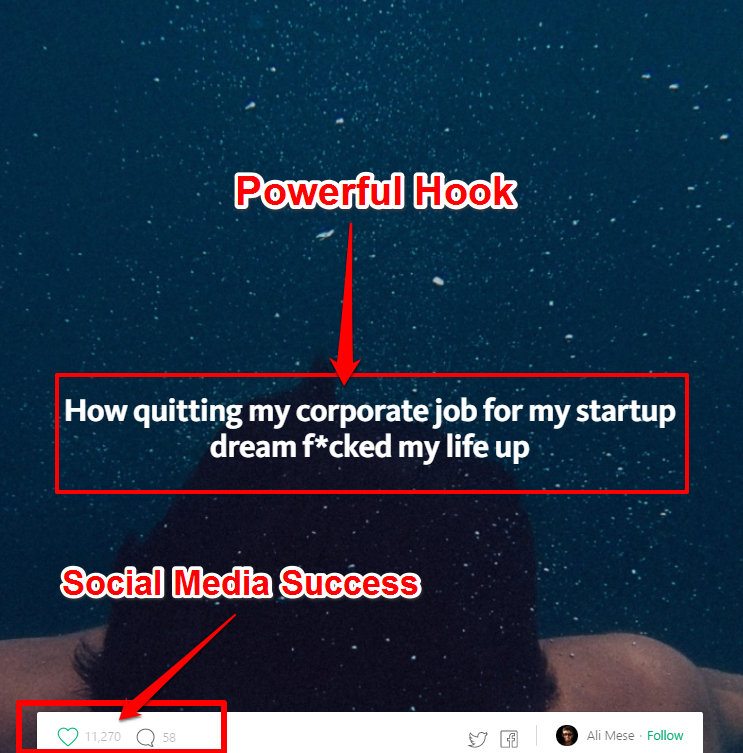
21. Your Success Story
People often underestimate how much effort and how many sleepless nights it takes to start making money from your business. The success stories are, as counter-intuitive as it may seem, a way of bringing people’s feet on the ground – exposing the entire picture of your success, not just what’s noticeable from behind the shiny screens.
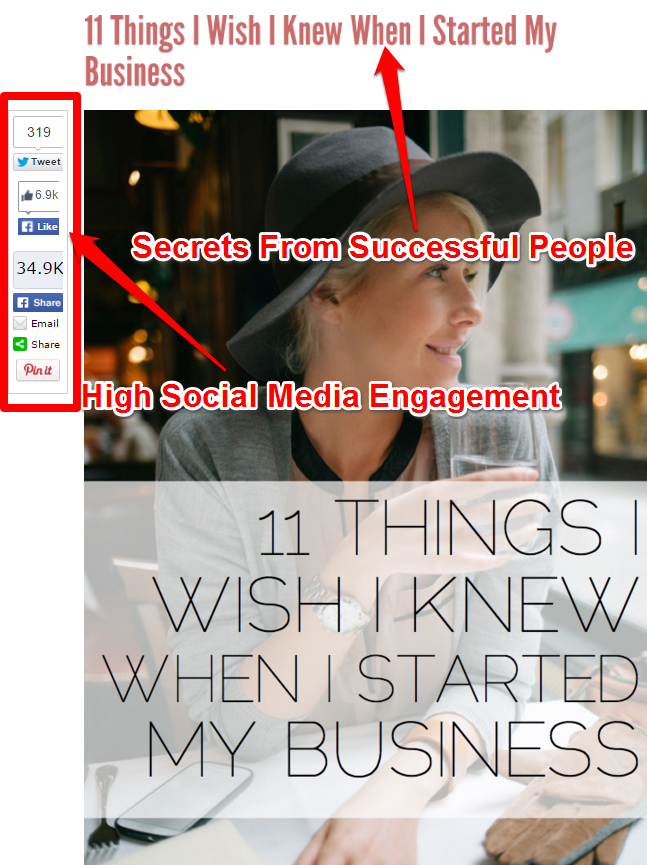
22. Storytelling via Evergreen Posts
Not everyone can put very distinct elements together in an attractive, useful way. However, these very few are being referred to as storytellers – and they never have to worry about the number of people reading their articles. And while it sounds otherworldly, it has nothing to do with magic, but lots of research, constant professional development and maybe a drop of inspiration.
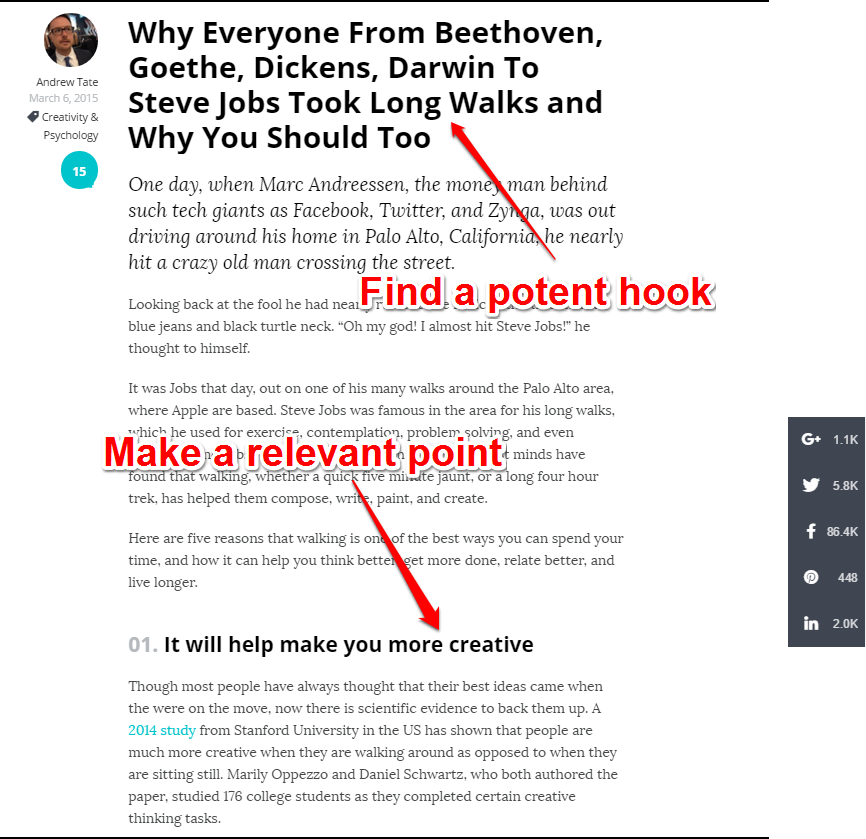
23. Encyclopedia Entries
While there is no scientific ground to stating that we process visual information 60,000 faster than when written, visual marketing seems to have a great success, notably when people don’t want to spend too much time in front of an article.
Deliver your information in a manner that engages and flows.
Sometimes an infographic is even more efficient than an in-depth textual approach, depending on the nature of information you wish to deliver. However, it’s best to update it from time to time, just so people know you’re on a constant search for progress.
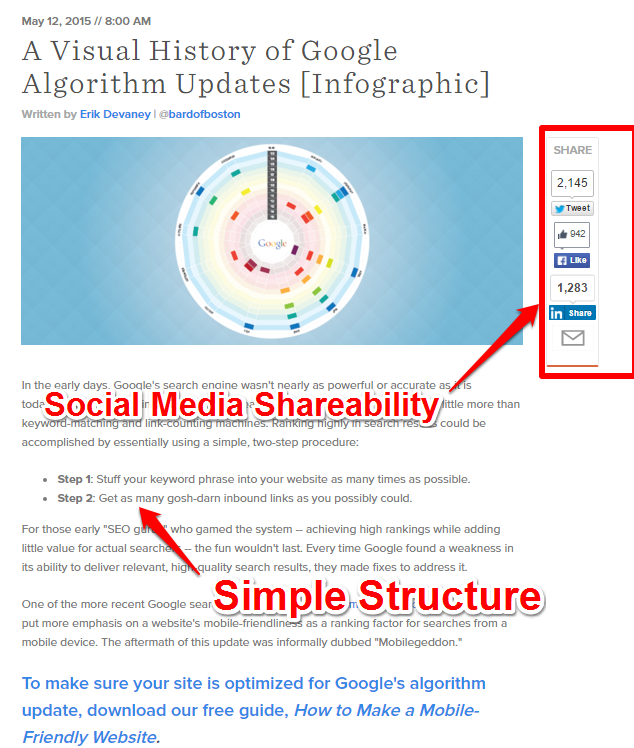
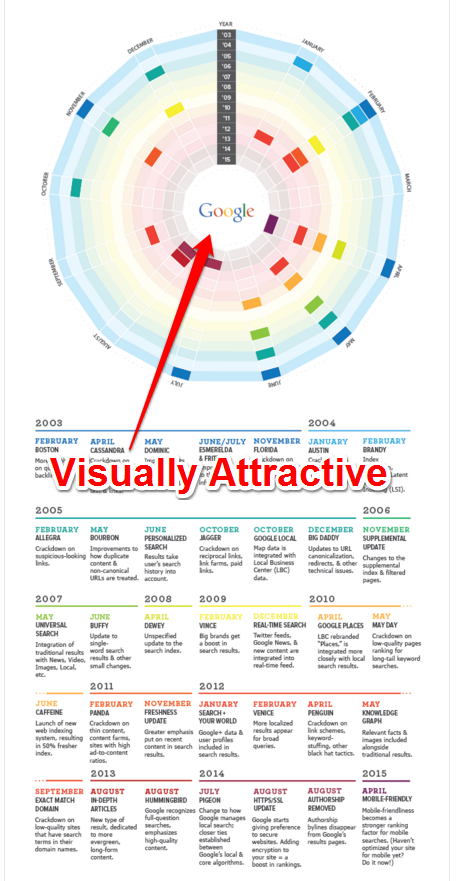
24. Pros and Cons of Something
We like to think that our decision making processes are exclusively rational. That is false. It turns out that our every decision is based on emotional resources as much as it is based on rational ones – which can best be exploited in listing popular opinions as pros and cons.
Use emotional attributions to build pros and cons on a topic, based on the factual data.
Besides helping people to make decisions, this is also a great resource for documenting a topic that is on everybody’s minds. Polarization of a subject is tricky, but whenever the situation allows it, you can transform it into a very useful source of information.
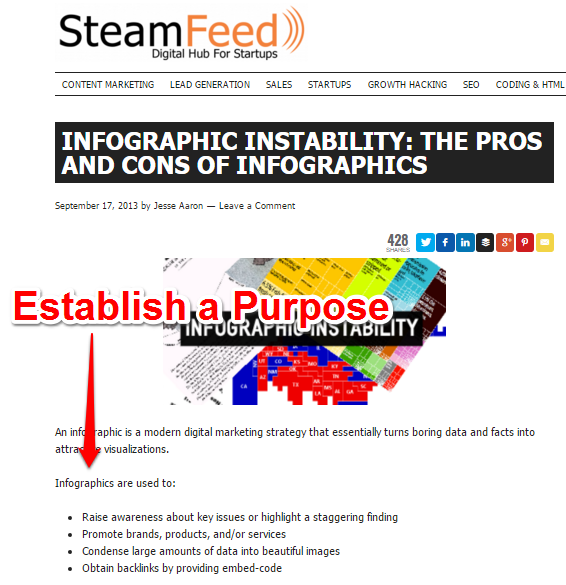
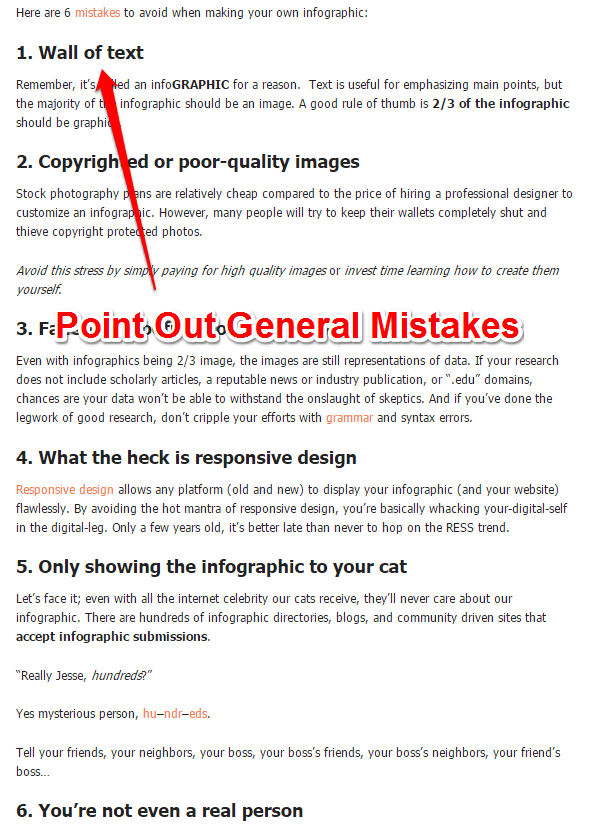
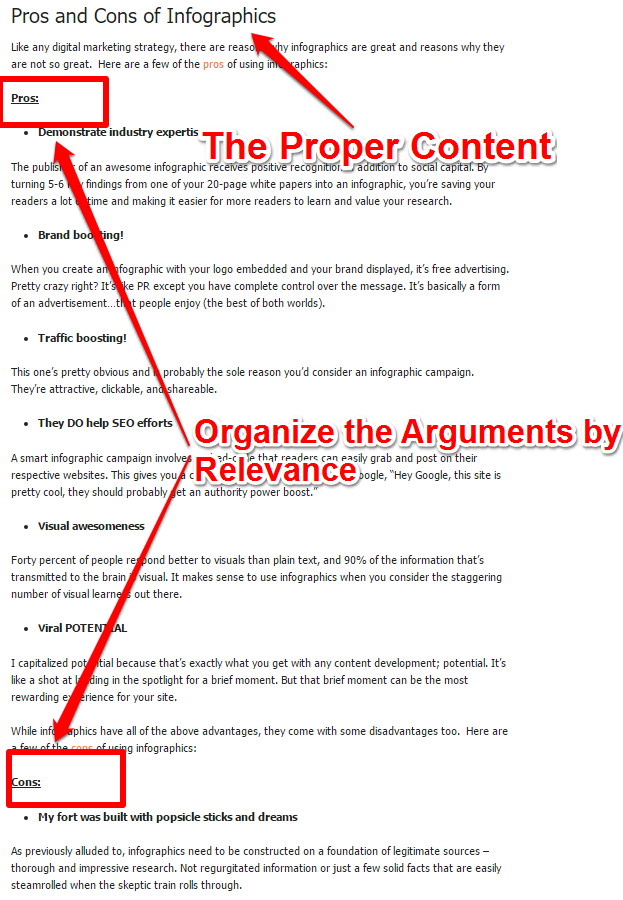
Conclusion
There are endless things you can do content-strategy-wise to make it actually say something to your audience.
According to our analyses, exceptional evergreen content comes with a hook that stands out as information with competitive advantage.
Writing news-related articles is vital as it shows interest for posh, brand new stories in your domain. However, it gets even more relevant if you balance it with perpetually pertinent content that shows you know how you strategically manage your experience in dealing with information. While there’s no perfect content strategy recipe that universally applies, remember not to always choose sprint over marathon.
What other evergreen content types work for you?

 Site Explorer
Site Explorer Keyword tool
Keyword tool Google Algorithm Changes
Google Algorithm Changes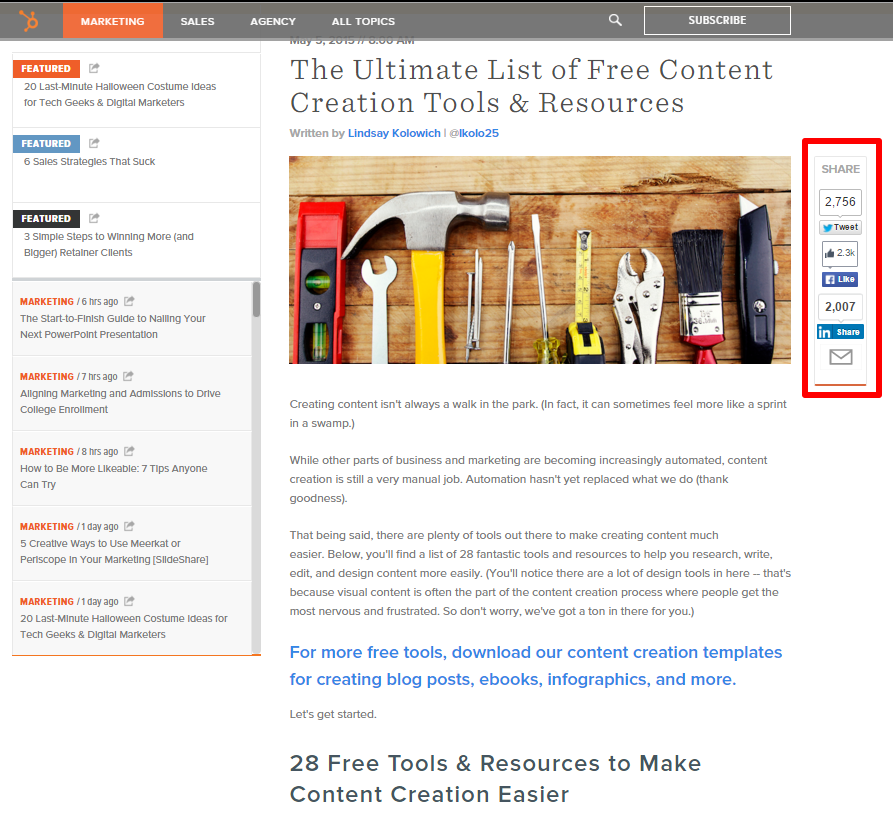
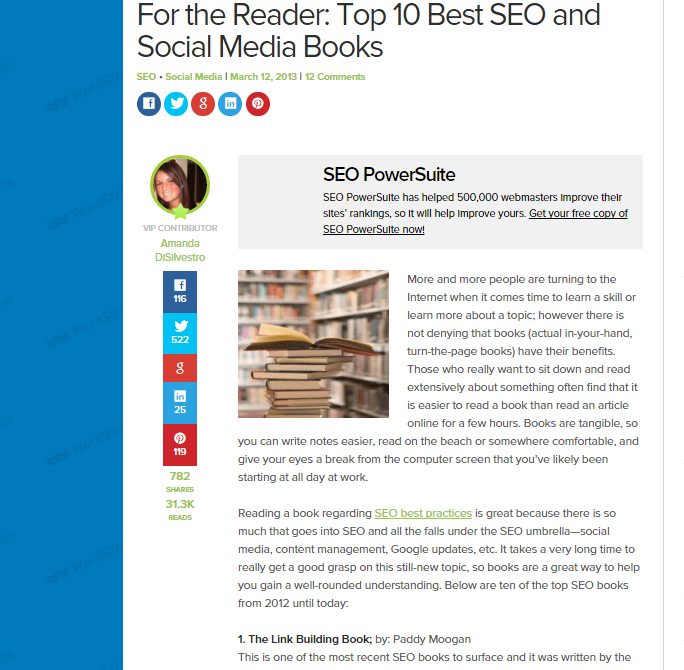


Wow. This is not so much a post as an epistle! I’ve added this post to Evernote and from this point forward whenever someone asks what is evergreen content. I’ll include this post in my answer. Thanks…
glad you liked it Todd. lots of ideas here. just waiting to be implemented 🙂
This is a Big List Razvan..
Roger everything said here. I think the real thing lies in content promotion cause without it none of these post types may not be getting the traction they deserve.
Nice list. Really helpful.
initial outreach may be required to let people know of the new quality content you produced. but this is a story for another article 🙂
So many ideas here – I don’t even know where to start! Definitely going to have to save this one for later like Todd did. If you care even a little bit about the future (and I certainly do), evergreen content is where it’s at.
i would say. just take one and implement 🙂
One point that hasn’t really been mentioned is that that upward trending of traffic is certainly not natural, nor the norm.
That’s assuming that you’re still regularly adding content and regularly gaining links. I’d say the norm is that a regular post peaks early and trends downward.
Evergreen will still rather consistent as people continue to share. That a post will miraculously gain momentum as time goes on is rather unrealistic.
This article itself is evergreen content! I’m definitely going to try some of these out. I’ve never done a case study, so I think I will try that.
Hey Razvan, Lots of evergreen content ideas here. I think I’ll use this list. I want my content to last longer. Do we still need to update our content even if it is evergreen?
Holy s… What an awesome list!
It gives a lot better understanding of evergreen content – And best of all will the tips be relevant many years from now.
By the way, I have send you a mail, hopefully you’ll reply 🙂
A great thing about evergreen content is that it can be re-purposed very easily and used for future distribution.
Over the years, I personally learned its content that drives traffic; not the amount of inbound links. And it’s not short tail content either. Writing quality evergreen content and taking personal time to answer your target reading audience displays meaningfulness in building and sustaining quality relationships that easily convert into sales without trying to make a sale.
Thanks for sharing WOW list! Almost 2 years ago, I wrote an article on Social Media Management niche and it is still an evergreen article. Currently, we are finalizing more content for our upcoming campaign, and your advices will certainly help us improve content.
Over the years, I personally learned its content that generates traffic. It is not the amount of incoming links. Nor is it a short tail content. Writing high quality evergreen content and spending personal time responding to your target audience offers meaning to build and maintain quality relationships that easily turn into sales without trying to sell ….